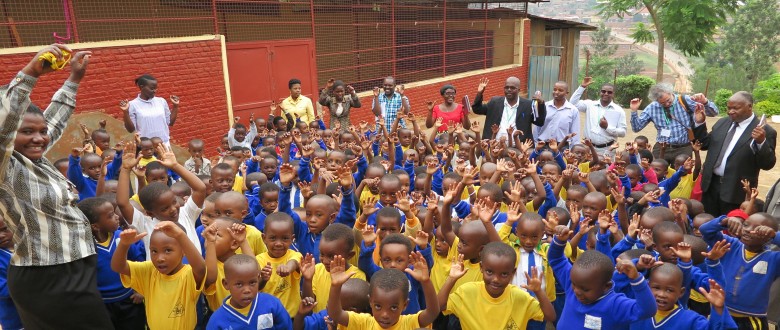
Cecile Ntakirutimana (right) is a Sector Education Officer in Gataraga, Rwanda. Along with 119 other Officers from all the districts of the country, she was trained by VVOB and the Rwanda Education Board to establish and lead professional learning networks for head teachers. Today she leads the professional learning network in her sector, which, in turn, contributes to the sharing and building of knowledge among head teachers and enables them to change or refine their practices.
Taking the lead
Cecile remembers a challenging time when bringing head teachers together from schools in her Sector to talk about common issues generated resistance: “Back then, I had to put myself in the teachers’ shoes to understand their obstacles, fears, frustrations and hopes.” This shows that bringing together professionals does not in itself guarantee peer learning, growth or development. More is needed.
In situations like these, good leaders who foster a cooperative climate in which learning and growing opportunities can arise, are essential. To that end, VVOB organised four Professional Learning Networks workshops for 120 Sector Education Officers like Cecile. They focussed on how to establish, lead and coach professional learning networks for head teachers in their individual sectors.
“We gained new insights in school leadership standards and learned about key enablers for success,” Cecile explains. “These enablers deal with having purpose and focus, building strong relationships, fostering good collaboration, strengthening effective leadership, and encouraging accountability.”
Being a catalyst
The building of trust between head teachers, teachers, Sector Education Officers and other people involved, is an intrinsic part of the strategy for effective school leadership. Cecile has already witnessed that when this is achieved, professional learning networks can be powerful tools. Head teachers are able to identify and acknowledge their weaknesses and limitations when meeting with and learning from their peers.
“As we address issues through the collective wisdom and the sharing of experiences by head teachers, we gain new perspectives on issues like school feeding, school sports, drop-outs, school performance and parental involvement. In this process, Section Education Officers can be catalysts. I really encourage my colleagues to massively attend these workshops and other activities. I hope that more exercises and school visits will be organised to help participants better grasp the theories.”
Currently 120 professional learning networks exist, with a total outreach of 962 head teachers, or eight head teachers per sector. You can find four examples of professional learning networks in four different sectors below.
Rwanda Education Board and VVOB undertake regular field visits to the networks to monitor and evaluate the progress of the Sector Education Officers and to assess learning and behaviour change among the sector’s head teachers.
Magazine for school leaders
A magazine called Urunana rw’Abarezi was also launched to create a platform for sharing experiences on and best practices of professional learning networks and effective school leadership. It is published by the Rwanda Education Board with VVOB support and is distributed freely country-wide.
The first issue, ‘Peer Learning for School Leaders’, provides background information on the concept of professional learning networks and shares the observations of some participants of the first professional learning networks. Cecile also makes an appearance and talks in more detail about her positive experience with professional learning networks. The second issue, ‘The Impact of Parental Involvement in Education’, zooms in on the role parents and the larger community play in quality education. The third edition, ‘Tackling Dropout’, shares good practices on preventing dropout and calls for more inclusive teaching.
LOPE
The establishment of well-functioning professional learning networks is one of three result areas of the overarching programme on improving Learning Outcomes in Primary Education (LOPE). LOPE is a programme (2014-2016) that falls under the umbrella of the Rwandan Ministry of Education and is implemented by VVOB in partnership with the Rwanda Education Board and the University of Rwanda – College of Education.




